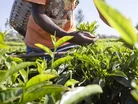Releaf’s smart food factories & the supply chain

In 2022, the global food market’s revenue hit US$8.66tn – and that number is expected to grow each year by 6.72%.
Yet, according to the UN, 25,000 people still die of hunger each day, while 10% of the world's population is undernourished. Continuous conflicts disturb the supply chain, making it difficult to export fresh produce and sending prices up, while climate change impacts harvests with irregular floods and droughts.
But hungry humans become quick problem solvers. Uzoma Ayogu is the CTO and co-founder of Releaf, a food supply chain technology social venture founded in 2017 and based in Uyo, Nigeria. Its mission is to industrialise food processing by moving food production from traditional centralised processes to decentralised ones, through the use of smart food factories and by bringing power to the farmers with efficient manufacturing equipment, health insurance and dignity.
“We're placing food processing much closer to farmers, so we can increase the throughput of farmers and the quality of food, while also decreasing the cost of food for consumers, both on the factory side and, eventually, on the consumer side.”
As CTO, Ayogu handles all the hardware and software development for Releaf.
“What we like to say is that Ikenna, the CEO, raises the money, and I get to spend it to drive results! I use our results to hire more people.”
Releaf co-founders Ikenna Nzewi (CEO) & Uzoma Ayogu (CTO)
“The manufacturing sector should recognise the productivity and the dignity of people working within the food value chain” - Uzoma Ayogu
Tech-enabled solutions and smart food factories
Releaf utilises various tech-enabled solutions in its work. One of these is Kraken – which is not related to the sea monster, but rather to the verb ‘cracking’.
There are four million palm oil smallholder farmers whose work is set back by slow processing systems.
“Kraken is our first hardware product,” says Ayogu. “Oil palm is are our first value chain. Today, smallholder farmers in the oil palm value chain are cracking palm nuts in a very manual way. Literally, some people still use rocks, so we've developed a de-sheller that's 200x more productive. It can ensure about 8% better quality for the end product.”
Oil from palm nuts is used in cooking, biofuel and even beauty products. With Kraken, Releaf is essentially developing a factory that it can place in the best position for these farming clusters to take on the role most efficiently. But that's only one part of Releaf’s business. Ayogu wants to be able to develop the right technology for this decentralised layer of food production. But, says Ayogu, while it's one thing to develop the right technology, it’s just as important to know where to put it – this is where geospatial technology comes in. Releaf is currently working on a new software solution that uses geospatial data and machine learning models to find out where the most oil palm trees are located and what the expected yield is going to be.
What's different about Releaf versus other geospatial companies is that, because it is already operating in the value chain, it can have strong bottoms-up data and is able to make its models far more efficient and reliable – which can also be achieved through building a strong relationship with farmers.
“Our mission is to industrialise food processing, yes, but with a farmer-centric mindset,” says Ayogu. “So, if your farmers are very happy, you're able to minimise these expenses. We can grow our market share quickly while also developing this community.”
Feedback from farmers and the supply chain
The response from leading food manufacturers across Africa has been encouraging.
“Our customers are happy because we're reliable,” says Ayogu. “We communicate well and our quality is excellent, it's been cited. We’ve had US$75m in bookings for this year! The demand is absolutely there, and we're excited about what we're doing.”
When Releaf started its health insurance programme, the farmers weren’t familiar with the concept of paying upfront for something that they might not even get value from. A lot of people were sceptical, so they subsidised it at first-week pay when they signed people up.
“In the first quarter, about three people used it,” says Ayogu. “It was just focused on malaria and typhoid coverage because they’re primarily what people are getting sick with.”
Now, farmers contact the Releaf call centre when they want to let the company know that they have crops available.
“Sometimes, they'll call us to talk about problems they're having in their lives. For us, that's another level of affinity,” says Ayogu. “Releaf is not just someone who buys crops. Releaf is a farmer's best friend and that emotional connection with the brand we're building is, I think, the most powerful long-term road for us.”
A key part of its strategy is to be seen as the company that has access to the farmers, without having to own the land for the farms.
“Releaf is getting creative about how the manufacturing sector can recognise the productivity and the dignity of people working within the food value chain,” says Ayogu.
Nigeria became the 6th most populous nation in 2020, with 216m people, and the food supply crisis is hitting closer to the Nigerian farmers Releaf works with.
Ayogu’s prediction for the global food supply chain is that, with the help of Releaf and other food manufacturers, Nigeria can rise up and export its product across a growing human population.
“When Nigeria becomes the third most populous nation in the world, we want to switch the paradigm,” says Ayogu. “We want Releaf to help Nigeria to become the breadbasket of the world with processed products.”
While Releaf sadly accepts that food supply chains are going to continue to struggle, Ayogu knows that the answers do exist.

